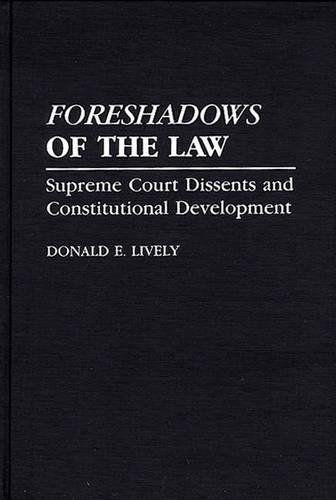
Foreshadows of the Law: Supreme Court Dissents and Constitutional Development
(Hardback)
Publishing Details
Foreshadows of the Law: Supreme Court Dissents and Constitutional Development
Bloomsbury Publishing PLC
Praeger Publishers Inc
18th November 1992
United States
Classifications
Tertiary Education
Non Fiction
Central / national / federal government
Legal systems: courts and procedures
347.302
Physical Properties
Hardback
200
Description
The Supreme Court has final authority in determining what the Constitution means. The Court's findings have not, however, always been final. Lively focuses on several landmark dissenting opinions--resisted initially--later redefining the meaning of the Constitution. Each opinion arises from a rich historical context and involves constitutional issues of pointed significance. Vivid descriptions of some of the colorful personalities behind the opinions add appeal. Lively conveys the evolutionary and dynamic nature of the law demonstrating the relationship between present and past understanding of the Constitution. He describes the competitive nature of constitutional development and identifies the relevance of factors including subjective preference, values, vying theories, and ideologies. The role of the Court, is addressed as are the federal government's relationship to the states and their citizens; slavery; property rights; substantive due process; freedom of speech; and the right to be left alone. This is a clearly presented and highly instructive consideration of how the Constitution's interpretation has been fashioned over time with important insights relevant to today's Court and contemporary cases.
Reviews
As a law professor and as the author of three well-respected texts in the realm of constitutional law, Lively is clearly qualified to prepare this book on Supreme Court dissenting opinions. The book is clearly written and up to date. Advanced undergraduate through faculty.-Choice
Author Lively analyzes how dissenting opinions in the Supreme Court contributed to the development of basic rights and liberties. . . . He draws clear lessons for contemporary debate on constitutional rights and protections.-Legal information Alert
"Author Lively analyzes how dissenting opinions in the Supreme Court contributed to the development of basic rights and liberties. . . . He draws clear lessons for contemporary debate on constitutional rights and protections."-Legal information Alert
"As a law professor and as the author of three well-respected texts in the realm of constitutional law, Lively is clearly qualified to prepare this book on Supreme Court dissenting opinions. The book is clearly written and up to date. Advanced undergraduate through faculty."-Choice
Author Bio
DONALD E. LIVELY is a Professor of Law at the University of Toledo College of Law. He is the author of Modern Communications Law (Praeger, 1991), Essential Principles of Communications Law (Praeger, 1991), and The Constitution and Race (Praeger, 1992).
